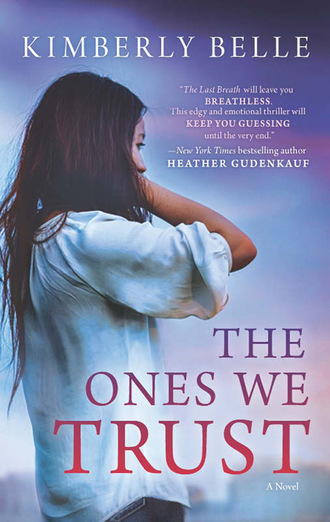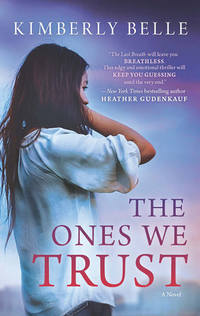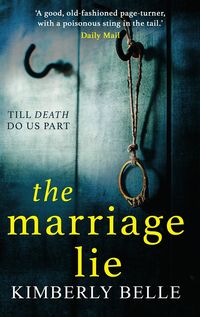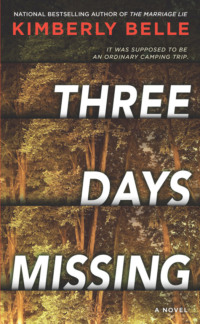
Полная версия
The Ones We Trust
It’s all I needed to say. The background noise plummets into a muted silence, and Floyd’s tone makes a drastic U-turn, from fun and Xbox games to all business. “Give it to me.”
I relate a quick lowdown on Maria, being careful not to reveal any more detail than absolutely necessary. Her name, her moving-on-up lifestyle and very little more. I don’t mention a word about her five minutes of internet fame. If that’s connected to her bank account in any way, I want Floyd to ferret it out by himself.
“You got it,” he says, and I already hear his fingers flying across a keyboard. “I’m kinda slammed, so it might take me a week or two to get to you. I’ll call you as soon as I know anything.”
“Thanks, Floyd.”
“Oh, and, Abigail?” He pauses, and I can hear his smile. “Welcome back, hon.”
* * *
After I hang up with Floyd, I wander through my house, looking for something to take my mind off Maria. I could unload the dishwasher and mop the kitchen floor. I could finish removing the drain in the bathroom and take out the shower pan. I could sort through the million emails in my inbox. Nothing sounds even remotely appealing. Maria’s images replay on a constant loop through my mind, shooting ice water through my veins, knocking me sideways with that smile, because my gut...my goddamn gut is telling me—three years too late—that I missed something the first time around.
I change into shorts and a T-shirt, shove my feet into my sneakers and bang out the front door to burn off my frustration in a long run through the district, but my feet get tangled up in something unexpected on my welcome mat. A large brown envelope. No address, no postage, no writing or stamps on it anywhere at all. I cut a quick glance up and down my quiet street, which is, of course, ridiculous. Whoever leaves an unmarked, unstamped envelope for a person on their front doorstep doesn’t wait around for that person to find it.
And while we’re at it, why me? This is the kind of thing someone leaves for a journalist, not a washed-up ex-journalist turned health care content curator.
I look up as a car slides by. A neighbor from up the street waves from behind the wheel, and I’m too frozen to wave back. I check up and down the street again, even though I know the effort is futile. Whoever left the envelope is long gone.
I carry the package into the house, hook a finger under the seal and rip it open.
At first, what I find inside doesn’t make any sense. It’s about twenty pages of sworn statements, a written transcript of someone’s testimony. Someone by the name of Corporal Daniel Kochtizky, a surname so uncommon that I recognize it from this past year’s news coverage.
Corporal Kochtizky was the medic for Zach Armstrong’s platoon.
I return to the papers, skimming the testimony. The first few pages contain a lot of back and forth on details like name, rank, title, then moving on to dates, locations, logistics of the battle. Pretty standard fare, and nothing I haven’t read before and in a million places.
I skim the testimony, refresh my mind of the details of the army’s most famous soldier, whose death became its worst nightmare.
Zach’s death was like one of those perfect-storm cases, where one little thing sets off a chain of seemingly innocent events that end in disaster. In his case, it all started with a broken-down valve on an armored vehicle that brought the entire platoon—thirty-five soldiers spread out over eleven vehicles—to a screeching halt. A spare part was summoned, the platoon was split, a battle ensued. Zach Armstrong took three bullets to the head. His brother Nick, crouched a few feet away, was the one to recover his body.
But what nobody seems to be willing to talk about, what the US Army has refused to even discuss, is who shot him. Even more suspicious, the army spent the first few months after Zach’s death touting him all over town as a hero. They awarded him medals and posthumous promotions in elaborate, nationally televised ceremonies. They built memorials and slapped his name on bridges and highways. They created scholarships and grants in his name. Meanwhile, nobody else was reported killed or wounded in that battle, not even the enemy.
Jean Armstrong called foul, and she demanded answers in the form of a congressional investigation into not just who pulled the trigger of the weapon that killed her son, but also the army’s subsequent handling of his death. General Rathburn—we’re not technically related, but he is my godfather—is one of the three-star generals being investigated. The other is General Tom Wolff. My father.
I’ve just flipped to the fifth or sixth page when it occurs to me.
This document has not been censored. There are no dark stripes of marker, no blacked-out names or classified details. Every single letter is there on the page, lit up like strobe lights.
I rush through the living room to my office and my computer. After a bit of poking around on the internet, I find the censored version of the same document on the Department of Defense’s website and hit Print.
As it’s rolling out of my machine, I nab a pink highlighter from the drawer and lay the pages side by side, highlighting the blacked-out words on the DOD’s version in pink on my gifted copy. The name of the investigating officer. Others in the chain of command. Comments that could be construed as opinion, the medic’s version of what happened, hearsay and accusations. And then, on page seven, I highlight a name I’ve never seen before.
Ricky Hernandez.
According to the medic, Ricky was present on the scene when Zach was killed, and he was one of the thirty-six eyewitnesses briefed back at the base. Thirty-six. My pulse explodes like a bottle rocket.
So why does every single transcript the army ever released, every news magazine article ever printed and every evening news report ever broadcast maintain there were thirty-five soldiers on the field the day Zach was killed? And now there are thirty-six?
Thirty-six.
The word travels through me like electricity, rushing through my veins at the speed of light. I stare at the pink-striped papers fanned across the surface of my desk, feeling my scalp grow hot, then cold, then hot again with the realization that I’m looking at classified information. Whoever sent it to me is someone with inside knowledge of the operation—a soldier? an army investigator?—and wants me to know the truth. They want me to know about Ricky.
I turn back to my computer, fingers flying across the keyboard. A few hours later I’ve compiled a mountain of papers to sort through. Every document the army and DOD have ever released around Zach Armstrong’s death. Every hit on Ricky and all four Armstrongs—soldiers Zach and Nick, mother Jean, brother Gabe—that my content curation software spits out. Thousands and thousands of pages.
A slow sizzle begins somewhere deep in my gut, heating me from the inside out. What if Ricky Hernandez watched three bullets tear through Zach’s skull on the battlefield that day? What if he saw whoever pulled the trigger? What if he pulled that trigger himself? At first, the warmth feels like a phantom limb, vaguely familiar and not entirely real, and then I remember.
This is what a story feels like.
I toe off my sneakers, lean back in my chair and get comfortable. I’m going to be here awhile.
6
Early Saturday evening, I’m studying my menu in Bar Dupont’s sleek lounge when a rhythmic thump-click, thump-click pierces the chatter around me like the steady beat of a drum. I twist on my bar stool, as do half the people in the place, and find my former boss, Victoria Santillano, coming at me on crutches. She’s wearing an oversize black boot on her right foot and a dragged-down expression, heavy with equal parts crankiness and effort. All long lines and sharp edges, Victoria has always had the hardscrabble air of someone who’s forgotten to exhale, only now she looks pissed about it.
“What the hell happened to you?”
She juts her chin at the dirty martini that, just two seconds before, the bartender slid in front of me. “If that’s vodka, extra cold and extra dirty, I need it far more than you do.”
I signal to the bartender for another and push my still full glass in front of the empty seat next to me. Victoria hobbles up to the stool, flings her crutches against the bar and drinks half the glass in one giant gulp.
“Jesus, that’s good,” she says, smacking her lips.
“Please, tell me that boot isn’t just a scheme to get free cocktails.”
She snorts. “Now that you mention it, it is one of the better perks. But, alas, no. Damn ankle broke in three spots, can you believe it?”
I can’t, actually. Victoria is one of the most indestructible women I’ve ever met. She’s trekked through deserts and jungles, crawled through caves and fields of land mines, chased down thieves and dictators and drug lords, and lived to talk about all of them in front-page, top-billed feature articles. The woman survives on adrenaline and vodka and caffeine, and the only thing I’ve ever known her to break is a nail.
“Were you rappelling off an Afghani cliff? Skydiving into a war zone? Scaling the Kremlin with fish wire and Scotch tape?”
“I fell down the stairs.” Her long, unmanicured finger comes within millimeters of my nose. “And if you tell anyone that’s how I broke my ankle, I’ll have you murdered in your sleep.” She plucks an olive from her glass with two hooked fingers. “So what’s new and exciting in content management these days?”
“Not one goddamn thing.”
“Excellent,” she says, nodding sagely. “Business services, was it?”
“Health care. Health&Wealth.com is the leading health care web magazine for today’s active seniors.”
“Mmm-hmm. Sounds fascinating.”
Victoria buries her nose in her glass, and I do the same with the fresh one the bartender hands me, neither of us quite willing to rehash old arguments. She was there when I broke the Chelsea Vogel scandal three years ago, and she was there two weeks later, after Chelsea was found hanging in her Herndon shower, when I shoved my press pass to the very back of my kitchen junk drawer and handed in my resignation letter. She never questioned my decision to quit. She never, not once, tried to talk me out of it. She just told me to call her when I found my balls.
For the next six months, I sent her every type of ball I could come up with. Soccer balls, baseballs, tennis balls and footballs. A ten-pound bag of meatballs and a monogrammed bowling ball. A framed vintage poster of Lucille Ball. A custom Magic 8 Ball where every side of the triangle popped up as “Hell, yes!” Finally, when I paid a delivery service to dump a box containing a thousand ping-pong balls onto her office floor, she sent me a one-word email. “Uncle,” it said in the subject line, and nothing more. After that, we picked up where we’d left off, with regular email check-ins and cocktails every time she swings through town, which is often.
But we never broach the one subject that hangs between us in gleaming, glittering strobe lights—that by walking away from the Chelsea Vogel aftermath all those years ago, I walked away from my duty as a journalist to seek the truth and report it to the public.
Only now I’ve spent the past thirty-six hours researching an article I’m not writing, looking into a story I’m not covering, and though I’m not certain I’ve found my balls, I have, without a sliver of a shadow of a doubt, found a thirty-sixth soldier. One who was in Zach Armstrong’s convoy of vehicles rumbling down an Afghani street when small-arms fire rained down from the upper level of an abandoned building. One who fought alongside both Armstrong brothers and was returning fire when Zach took three bullets to the head. One whose interview was cataloged and then buried, whose name disappeared from every army account except one—the uncensored transcript I’m not supposed to have.
“What?” Victoria says, studying me with squinty eyes.
“What do you mean, what?”
“I mean, what’s going on here? You have that look about you, like maybe I should check between your teeth for canary feathers.”
My skin prickles, and my scalp buzzes with the thrill of new knowledge I can’t hold in another second. “Okay, so I’m not saying I’m writing anything, but say I know something that no one else knows about the Zach Armstrong story. Something new. Something earth-shattering and groundbreaking.”
“How earth-shattering and groundbreaking?”
“Enough that the DOD buried it.”
Victoria takes in my words like a seasoned journalist who’s seen and heard it all, with a pursed-lipped nod. She reaches for her martini. “I see. And what exactly did they bury?”
“A name.”
She looks up from her glass with an arched brow, the same arched brow I’ve seen her use on rapists and swindlers and serial killers, when she asked them if perhaps they shouldn’t have wiped down the door handle after leaving their prints all over it. “A soldier’s name?”
I confirm it with my own pursed-lipped nod, but I don’t reveal anything more. The thing is, as much as I like Victoria, she is completely ruthless when she smells a story. Even back when I worked for her, when she served as both my boss and my mentor, I was always careful to never reveal too much until I sent her the final copy. I didn’t trust her, not completely, to not run off with my story.
But since Ricky’s name has been wiped from every report the DOD or army has published, I’m fairly certain that no matter how hard Victoria looks, she’ll never find him.
“Where’s my Magic 8 Ball when I need it?” Victoria pounds a fist on the polished maple bar, and her next words pierce the music and bar chatter like a bomb siren. “Hell, yes! I knew it!”
Packed with corporate executives and political insiders, the Bar Dupont crowd is a seen-it-all-heard-it-all kind of crowd, but still. More than a few heads swing our way at Victoria’s outburst.
I try to ignore their curious looks. “Knew what?”
“That you’d be back eventually. Send me what you’ve got whenever it’s ready. If I don’t have a spot for it, I’ll make one. How many words, do you think? Three thousand? Four?”
“Hold up. I never said I was writing anything.”
“Please.” She waves a palm through the air, takes a long pull from her glass.
“Please what?”
She rolls her unmascaraed eyes and thunks her glass onto the bar hard enough to send liquid sloshing over the sides. “Please, stop fooling yourself, because you’re not fooling me. The very fact that we are sitting here, talking about Zach Armstrong, is proof you’re already writing the piece in your head. You didn’t tell me about the additional soldier because you were filling me in on what’s been going on in your life. You were looking for validation, and you knew I’d give it to you.”
Well, hell. Does Victoria have a point? Did I come here looking for her to tell me to write the Armstrong story? It’s a theory I hadn’t thought of yet, though I certainly am now, and the answer is maybe.
The truth is, discovering Ricky’s name has cracked something open inside of me, something that feels as if it’s been hibernating for a really long, really harsh winter and now might be ready to step into the early-spring sunshine. And while I’m certainly not already writing the piece in my head, why not hand him over to Victoria instead?
Because he’s my lead.
At the unwelcome thought, a familiar and greedy rush, as uncomfortable as an old, itchy sweater, warms my blood and coats my skin like a rash.
Victoria must read the indecision on my face, because she drains her glass, signals for another round, then twists on the bar stool to face me.
“I’ll tell you what the wisest journalist I know once said, and that is this. Our profession holds the power to be a force for good, and in the end, credit will go to the ones of us in the ring, the ones covered in sweat and blood and tears, and not the ones watching from the safety of the sidelines. Get out there, and be fully informed, fully aware and fully engaged. Be part of a force for good.”
“You said that, last year in a graduation speech at Princeton.”
“Harvard, but that’s neither here nor there. What matters is the message. Are you or are you not going to be part of the force for good?”
“I was part of the force for good, remember? Until I became the cause of something bad.”
“How many times do I have to say it?” Victoria leans into me, her tone fierce and forceful. “Chelsea Vogel’s death was a tragedy, but you did exactly what you were supposed to do, and that was report the facts. The decisions and actions were all Chelsea’s. She slept with her female assistant, she took her own life. As much as you seem to enjoy playing the part of martyr, you are not responsible for her death.”
“I’m not sure I agree.” I tell her about Ben Vogel’s surprise appearance at my front door, and my taking another, closer look at Maria in light of her nouveau-riche lifestyle and pornographic internet performance. “Only, if what I now suspect is true and Maria is not as innocent as she led everyone to believe, then I’m even more responsible than I thought.”
“Not necessarily. Maybe Maria didn’t realize her sexual prowess until she gained some with Chelsea. Maybe it took seeing how those videos went viral the first time around for her to come up with a plan to do it again, this time for a wad of cash. My point is, Chelsea’s story is not finished. There’s more to tell, and there’s no one on the planet more qualified—or more justified—to tell it than you. Expose Maria as a conniving slut who ruins lives and sleeps with anything with money or power if that’s what she is. Set the record straight.”
“Maybe she’s not a conniving slut at all. Maybe she won the lottery or...I don’t know, found a pot of gold.”
“Only one way to find out.”
Victoria doesn’t say the rest. She doesn’t have to. She’s telling me to dig deeper into Maria’s story, to do the research, to search out the facts. But she doesn’t have to tell me to do that, either. I’ve already got Floyd on the case. No matter what I end up doing with the answer—handing it over to Ben or stuffing it in a box and pushing it to the very back corner of my mind—I already plan to find out.
But still.
“What if I write something, and it happens all over again? What if somebody gets hurt?”
“Somebody always gets hurt, Abigail.” Victoria lifts her shoulders high enough to brush the ends of her fringy bob, then turns back to her drink. “But if you do your job right, nine times out of ten it’s the bad guy.”
7
The next time I walk through its double glass doors, Handyman Market looks more like a haunted house than a hardware store. Orange lights and black streamers and miles of fake cobwebs are slung from every display and shelf unit, hanging above tombstones, cauldrons, smoke machines and every other front yard decoration imaginable. I walk down the middle aisle, past the ghouls and ghosts and glow-in-the-dark skeletons, sidestepping a grinning witch straddling a broom, in search of Gabe. I find him atop a ladder in the electrical department, loading boxes onto a top shelf.
Recognition flashes across his face in the form of that extraordinarily ordinary grin.
“Abigail Wolff is back, and less than a week later, which we all know can mean only one thing.” He swings himself down off the ladder, the metal rungs squeaking under his weight. “You flooded your house, didn’t you?”
I pretend to be insulted. “Do you really have that little faith in my abilities?”
He leans in, and his grin widens. “That bad, huh? Come on. I’ll show you where the shop vac and drying fans are.”
“Ha-ha. My bathroom is demolished, and look—” I hold up both hands, wiggle my fingers in the air “—still have all ten. No water damage, either.”
Well, almost none. There was a little excitement when a pipe snapped clean in two as I was unscrewing the showerhead, drenching me and the bathroom floor in the process, but I had the rags and the mop, and the water turned off in thirty seconds flat. The only real damage done was to my blowout and a wall I was already planning to paint over anyway.
He holds out his hand, palm to the sky. “Let’s see it, then.”
For a moment, I’m confused. “See what?”
“Your list.” He steps closer, and I can smell the detergent on his clothes, the sawdust coating his apron, his shaving cream spicy and complex. “Does it have Find Handyman ASAP written anywhere on it, because I’ll bet it does.”
His sarcasm, his teasing tone, his half-cocked grin. So far I like everything about him, and it’s distracting me. His closeness is distracting me. His thick shock of hair is distracting me. His looks as if it hasn’t been combed in days, but instead of making him look ungroomed, it makes him look really good in a way that makes me uneasy. Especially in light of what I came here to tell him.
A bitter taste pools on my tongue, as if I’m sucking on old pennies. This is going to be so much harder than I thought.
Because if I’ve learned anything from Chelsea’s death, it’s that I have a lot to make up to the universe for my hand in it. When I set in motion events that ended in her lifeless body hanging in the shower, I upset the universal balance just as surely as pitching the planet a few degrees would transform the earth’s climate. In order to tip the karma scale back to good, I have to do good. I have to do what’s right, which means I have to tell someone about Ricky.
And it has to be one of the good guys.
Just say it, I think, glancing around, my gaze skimming over the lone customer all the way down at the end of the aisle, an elderly man sorting through a markdown bin. He doesn’t seem to be paying us much attention, and he probably can’t hear us from here, but I lean in and lower my voice anyway.
“I need to talk to you about your family’s case.”
Gabe freezes in momentary confusion, but it doesn’t take long for him to catch on, and his expression to catch up. The muscles tighten in his jaw, his mouth, the skin around his eyes, and three vertical trenches slash up the center of his forehead.
“My family’s case?”
I nod.
“My family’s case.”
“Yes.”
Gabe takes two small but significant steps backward. “Are you a journalist?”
“I’m a former journalist, and I’ve found something that—”
“Jesus!” he says, and fiercely enough that the man at the end of the aisle looks up in alarm, dumps his items back in the bin and scurries around the corner. “I can’t believe I actually bought your ridiculous bullshit story about renovating a bathroom. Unbelievable! Is your name really Abigail Wolff, or was that a load of crap, too?”
“Okay, so admittedly, my skills at approaching sources are a little rusty, but, yes.” I take a step in his direction, but he holds me off with two palms in the air. “My name is Abigail Wolff, I used to be a journalist, I have the credit card bill to prove I’m renovating my bathroom, and I came here with information that could make your family’s case take a hard left turn.”
“I’ll make this very simple for you, then. My family is in the middle of a federal investigation. None of us are allowed to talk about the case. If you had done any background research at all, you would know that.”
A fleeting frustration zings up my spine, but I swat it away. I remind myself that Gabe sees me as the enemy, as a member of the same media who has painted him and his mother as ferocious and unreasonable. And with valid enough reason. He doesn’t know me, doesn’t know anything about me. No wonder he sees my coming here as an ambush.
The realization pushes a friendly smile up my face, softens my tone to placating. “I don’t want you to talk, I want you to listen to what I have to tell you. Did I mention this information could change the course of your case?”








